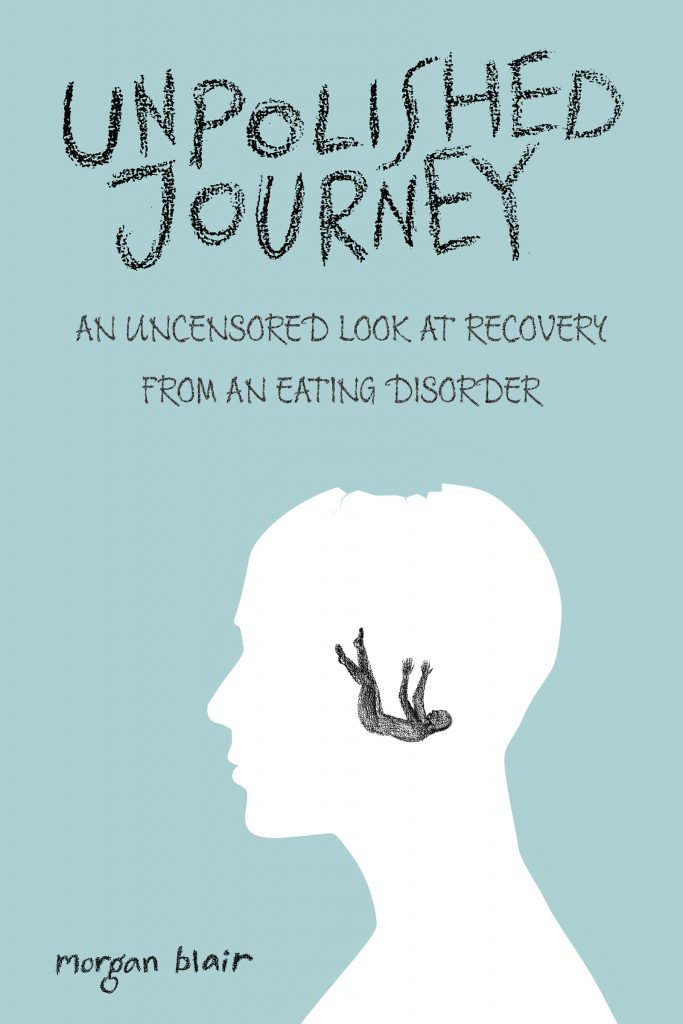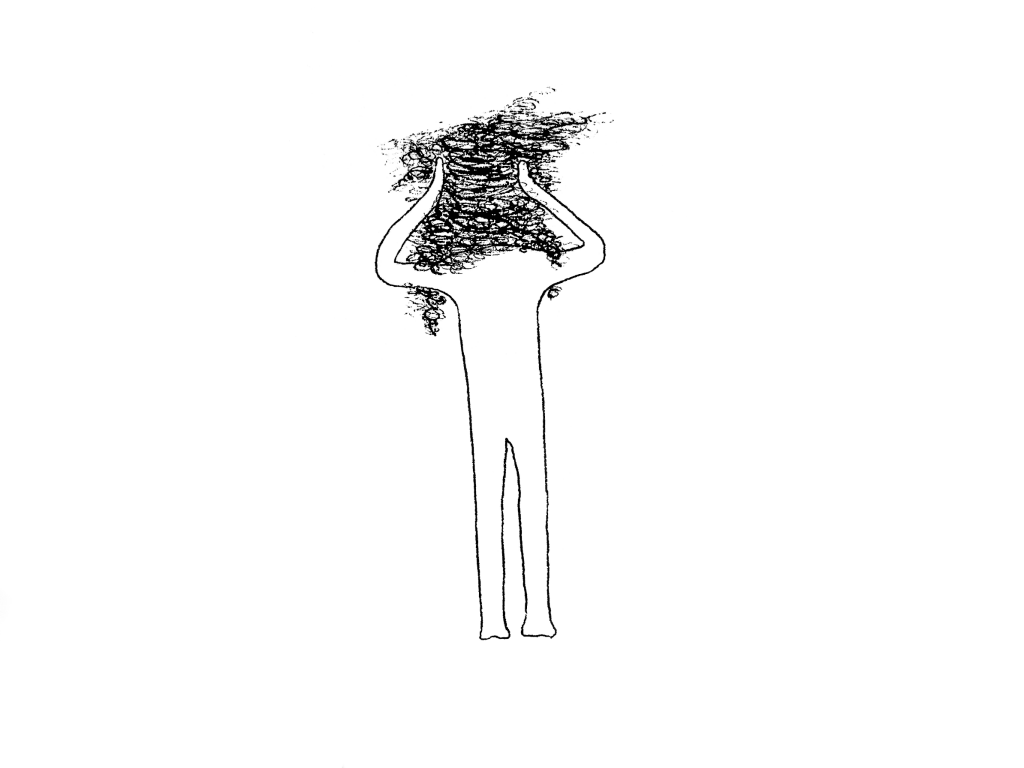
Ed silences us. Recovery helps us to find our voice. That is just what Morgan Blair shows us with her new book, Unpolished Journey: An Uncensored Look at Recovery from an Eating Disorder. Congratulations, Morgan, and thank you for donating signed copies!
For a chance to win a signed book, see information at the bottom of this post.
Unpolished Journey: An Uncensored Look at Recovery from an Eating Disorder
06/23/16
“The body is a machine. You must use it or it gets rusty.”
 Win a Copy! See details below.
Win a Copy! See details below.
I came across this line written in one of my journals from 10 years ago. When I wrote this, I was eleven years old and referring to my body in relation to dance. Writing about how to improve myself as a dancer, I would first have to build the machinery of my body. Strengthen the legs, improve flexibility, stamina, concentration, etc., all things that to become a dancer—which at the time was all I wanted—are necessary. But what does it mean for my body to be a machine when I have an eating disorder?
Because I can tell you when I wrote those words at eleven, I wasn’t thinking in terms of fascination with my body’s abilities. I was writing from a place of resentment with my body’s inabilities. I wanted to be better, stronger, faster, and thinner. I wanted everything that my body was not giving me.
When my eating disorder began, I had very little knowledge about what was happening. I didn’t realize that with every minute spent obsessing about food or challenging myself to shrink a little farther, I was feeding a parasite inside my mind. I was allowing it to grow and grow and grow until it had swallowed any rational thoughts around body image, food, exercise, and my self-worth. But how was I supposed to know, when I didn’t realize there was a parasite overtaking the mechanics of my body?

After the parasite swallowed my mind, it had control of my body—with its only goal being to destroy its operation. Not all at once, no big explosion, or anything like that. That would be far too simple, and the parasite likes slow and painful downfalls, to shut it down gradually. Forget to charge it, forget to oil it, unscrew the bolt needed to connect the stomach to the heart or the heart to the mind. Allow the deconstruction to take time, to take effort, to happen so gradually that I—the person the parasite has invaded—am unaware of its reign.
Then there came a day when I realized something was not quite right. When I got up in the morning, my arms didn’t quite work, and my head was spinning. My legs were like lead and my stomach was in a constant knot. I went to charge my machine—my body, my life source—and found that I couldn’t reach my arms to grab the cereal for breakfast, or even the phone to call for support. I found that I was not in control, and I started to hear the voices in my head—the malicious banter of the parasite sitting in the control room of my mind. “Don’t eat that.” “Go running, even though you feel tired.” “If you eat that, you will have to eat all of that.” “If you touch that, you will grow rapidly and never stop.” “Do this, do that, do this, do that.”
But something strange happened once I became aware of the parasite. With awareness came a desire to push back, to restrain myself against the parasite’s demands. No one wants to be under the control of someone, or something else. I wanted my machine back in working order. I just couldn’t do it alone. So I called in some troops, professionals who had seen other parasites like the one inhabiting my body, and I let them start the excavation process, to dig as much as they could out of my mind.
All of that was good. All of that made sense. The development of an eating disorder, the realization you need help, and the journey through treatment has been talked about a thousand times over. But what happens after the professionals help you excavate the parasite? What happens when you are sent back out into a world with a newly discovered mind but a machine—or body—that no longer responds to your voice? What happens when you have spent years and years under the reign and direction of something else, and now suddenly you are expected to be the controller of your own machinery?
This is the point in the recovery journey that I personally found the most challenging. I felt the most lost, the most confused, and the most misunderstood. Here I was—someone whose entire existence had been shaped for the past decade or so by a disease inside my mind, who had put their life on hold for a long time to enter into treatment, to get help, to start healing—leaving and rejoining the real world with no knowledge of what my world should look like. I didn’t know myself, my body, my soul, or my spirit. I had left school and work, switched majors, lost friends, and lost my coping mechanisms. I was out. I was in recovery, with absolutely no idea of how to navigate or sustain it. All I knew was my eating disorder and now, by the grace of treatment, I knew it backwards and forwards. I knew my fear foods, new coping skills, and what emotions I had suppressed.
I knew eating disorders and could have written an entire book on what mine looked like alone. What I didn’t know was my machine—I didn’t know myself. I didn’t know my body, and treatment did not help me to figure that out.
Figuring out the body’s machinery after years of it being controlled by the parasite of an eating disorder has been the most rewarding and simultaneously painful experience I have ever endured. It is the part of the recovery journey that I am most passionate about—the part where you stop relearning the eating disorder. You stop counting exchanges, and managing weights, you stop obsessively talking about how the eating disorder snuck into your week, or how you failed to cope well on Saturday night. Though, all those things are needed in recovery as well, but what I am speaking to is the necessity of pairing them with meaning—pairing those nitpicky logistical aspects of eating disorder recovery with how to connect with the world again. How to wake up in the morning and be able to know that you have a larger purpose than what you are going to have for breakfast, or how far you will run at the gym. To know that you are in control of that machine you live in, that it is charged, and oiled, and ready to take you wherever you desire to go. This is recovery. Recovery is about passion. It is about moving past simply maintaining the body’s machine and finding a sense of normalcy around maintaining health, food, weight, and exercise so that you can quiet yourself enough to hear the slow, constant hum of the soul. The soul only sings when the machine is running, when it is in order—updated, waxed, and shined. When the body is healthy, then the soul is present.
What fills the soul is the most important aspect of sustaining recovery. Until I found things to fill mine, I could never remain in recovery. Instead I would go to treatment, heal the body, talk of coping skills, leave, and relapse—over and over again, until one day I stopped long enough to see that this doesn’t work, that the healing of the body without taking time to listen to the soul will only reap destruction. Destruction is all I knew. The parasite taught me how to deconstruct the machine, and so when I would leave treatment and become the director of my body again, that is what I would fall back on. Destruction.
I don’t blame myself because I didn’t know any better, but if I were to have taken a minute to listen to the soul, it would have been there all along—quiet for many years, but always there. It would have been singing those times I left treatment about the ocean, and art, and writing, and traveling. It would have been giving me a meaning for sustaining my body’s machinery. I just didn’t know I was supposed to be listening.
So, what is it like to see my body as a machine? Fascinating. Breathtaking. Stunning. To think that the heart works with the brain, and the brain with the lungs, and the lungs with the throat, and the throat with the stomach. It is a dance, a dance to the song of the soul who sings constantly to the rhythm of the machine’s hum. My blood is always pumping without my knowledge of it. My brain is always sending out electric currents without me realizing it. My body is a complex array of systems that together give me the ability to write, dance, dive, wake up in the morning, smile, laugh. It is the soul that gives me butterflies in my stomach when I think about my spirituality, or the deep belly laughter when I think about those I love, or the overwhelming longing when I think about the ones I have lost. I found the soul in the ocean when I went scuba diving. I found one place where the parasite, or the eating disorder, had never been before. I figured out that the parasite couldn’t swim, and that beneath the surface I could see life through a new lens. I found the soul in writing, in words given to those struggling with eating disorders, through connecting with others and offering them streams of hope. The soul lives in my faith, in my Higher Power, in all of the things that give me a sense of passion, purpose, and meaning. The soul is the feeler: the body is the doer. Unless they work together, nothing will actually be achieved in recovery.
This is my constant encouragement for those struggling with eating disorder recovery: to lean on the things that make you feel something. Lean on something positive. It doesn’t have to be anything huge, like scuba diving. It could simply be the fact that you think flowers are beautiful, so you buy a flower or go to a park and sit next to some flowers. Think about why it is they look beautiful to you, and then hold onto that for your recovery. Apply some beauty into your thoughts, actions, and intentions, and see where that takes your recovery for the day. Continue this. Do it every day until listening to the soul is routine, until the soul is in line with the machine you are learning to control and direct without the rule of the parasite inside your mind.
About Unpolished Journey:
Unpolished Journey takes the reader through a raw and uncensored look at what recovery from an eating disorder, depression, and PTSD look like on a daily basis. The book is a collection of journal entries spanning the course of six years where through poetry, short stories, prose, and a jumble of other thoughts in an honest portrayal of the realities of mental illness are unearthed.
Morgan Blair is an artist whose work is inspired by her mental health recovery journey. She is the founder of Unpolished Journey, an organization dedicated to promoting increased mental health awareness through creative capacities. Morgan is a graduate of School of the Art Institute of Chicago and is currently getting her masters at Northwestern University where she is studying to become a therapist. Whether painting, drawing, taking pictures, making videos, writing, or anything in between, Morgan can always be found getting her hands dirty while creating a new piece of art. Morgan never stays in one place and is always traveling around, exploring the world, and finding new spaces that fill her soul. Currently you can find her hiking mountains in Colorado and camping in back country places.
Win a Signed Book! To enter to win a copy of Unpolished Journey: An Uncensored Look at Recovery from an Eating Disorder, please post a comment below, answering: What is one gift of your brilliant body? (e.g., My body is strong enough to give birth!) Two winners will be randomly selected from all who comment. Jenni will notify winners via a comment on the blog within the next week, so please make sure that you are receiving notifications for new comments. (Winners must be US residents.)

